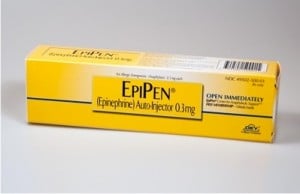
For the study, researchers followed more than 500 infants with known or suspected food allergies to egg and/or milk for a total of three years. All children were between the ages of three and 15 months at the onset of the study.
Parents of the children were told about the allergies, were educated on how to avoid trigger foods and had been given an injector in case an allergic reaction should occur. Yet despite the information they had been given, as many as 72 percent of the children experienced an allergic reaction during the course of the study. Another 11 percent experienced a severe reaction, which can include difficulty breathing, hives, swelling and a drop in blood pressure.
Most of the reactions were accidental – caused by parental forgetfulness or lack of supervision. Some of the reactions were due to a misreading of food labels or cross-contamination during food preparation. About half of the reactions were while someone other than the parent was caring for the child.
“the less is, it’s very important to be very vigilant,” said Dr. Schott H. Sicherer, an expert in childhood allergies at Mount Sinai School of Medicine in New York, who worked on the study. “We as the physicians have to make sure we educate the parents.”
Of course, allergic reactions can and do happen. That’s reality. But treating the allergic reaction…well, that should be a given, right? Apparently not.
According to the study, only one-third of all children who experienced an allergic reaction received an epinephrine shot. Parents cited not recognizing the reaction, not having the drug at hand and being too afraid to administer it as reasons for failing to give the much needed shot. But that fear could cost a child it’s life.
“The children who should have received epinephrine in our study did not go on to die, luckily, bit it is a risk when the reaction is not treated promptly,” Sicherer said. “We need to emphasize to families that this is a safe medication. If they are in doubt, they should give it anyway. Nothing bad will happen from that.”
“I think people have a hard time getting over the hurdle of a shot, but it is a very small needle,” said Dr. Kari Nadeau, an allergy expert at Stanford University School of Medicine who was not involved in the study. “It’s key that people should carry the EpiPen and feel free to use it as appropriate – it’s the only lifesaving medication.”
Related Articles:
- Cereal Marketing to Kids Still Focusing on the Sweeter Side
- Sharing Makes Toddlers Happy
- Children Hospitalized for High Blood Pressure Doubles in Ten Years






